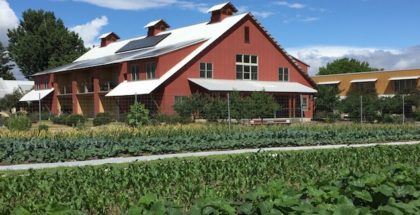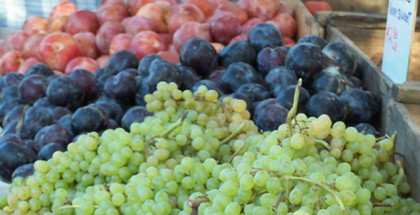The Life of a Local SoCal Forager: Dwight Detter Explains How Products Get onto Whole Foods’ Shelves
February 16, 2015 | seedstock
Dwight Detter, who will be leading breakout sessions on local food marketing and buying at the upcoming 2nd Annual GrowRIVERSIDE Conference, is a food forager.
But he’s not spending his days gathering nuts and berries from the forest. Instead, he’s sourcing local producers for Whole Foods Market in southern California.
Detter shares his region with two other Local Foragers; together they help select the products and the producers for 40 Whole Foods stores. He likens his role to a worker bee supporting the hive (in this case, the hive is a Fortune 500 company with $14.2 billion in revenue in 2014).
“That’s what the Local Foragers do; we go out and find the nectar, find the best and then help get them transformed to meet our standards and get them onto our shelves,” he says.
Drawing on decades of experience gained from working in the trenches of the food industry, Detter helps ensure that only the highest quality local products find their way to Whole Foods’ shelves.
“As the company is growing, the rest of the purchasing department is very much caught up with getting new stores open,” he says. “The role of the Local Forager is to be out there finding the people that can help us grow by bringing us the next greatest thing.”
Detter has worked in the food industry since leaving school, beginning as a dishwasher in San Francisco in the early 1970s.
“It was a wonderful time for food in San Francisco; the whole California cuisine was starting, from the Blue Fox to Alice Waters,” he recalls. Moving up through the restaurant ranks, Detter learned not only about the food industry, but the needs of California’s consumers.
After transitioning from restaurants to grocery stores and managing a boutique grocery in San Diego, Detter applied to work for Whole Foods. But after 10 years working in the prepared foods division, he was ready for a new challenge.
“About five years ago, an opportunity came about. Whole Foods created a couple of Local Forager positions for southern California, and I felt it was a good time to leave operations and just stick with purchasing. It gave me an opportunity to do what I really love, which is to work with suppliers.”
Detter spends his mornings replying to emails and reviewing paperwork for new and existing suppliers. In the afternoon, he meets with potential suppliers, either on the farm or kitchen, or in the store, to review their product and practices.
“When you come into our stores, you have certain expectations,” he says. “We have done our due diligence to make sure that people are actually following through on any claims they have made.”
According to Detter, potential suppliers are often intimidated by the size and scope of the Whole Foods Market operation. But he works closely with quality prospects to help them along, something he says is essential to retaining quality local producers.
“What I’m trying to do is help encourage and stimulate local production for local sales,” he says. “If we have something that we want to carry, and you only have enough for one store, then we’ll carry it for only one store.”
Detter helps potential suppliers to access Whole Foods’ low-interest loans. And once or twice a month, he holds Local 101 workshops for potential suppliers. During these classes, Detter touches not only on the steps a vendor must take to be considered for a Whole Foods branch, but also some of the basics involved with being a sustainable food entrepreneur.
One of the main issues Detter encounters with potential vendors is people not understanding the scope of their own business.
“The biggest challenge is getting people to understand what being a business person is, and understanding the difference between a hobby and a business,” he says.
Most of Detter’s workshops attract between 40 and 80 potential Whole Foods’ vendors, only two of which may actually end up with a Whole Foods contract. It’s not easy telling people that they aren’t going to make it to the shelves of Whole Foods, but as Detter explains, Whole Foods should never be the only potential relationship a food entrepreneur is considering.
“Just because we don’t think it’s a fit for us, doesn’t necessarily mean that you shouldn’t go ahead and pursue the business. There are plenty of other places to sell your product.” he says. “What I tell everybody to do is go in, walk stores, and look at what is there and what isn’t there.”
He also advises would-be food entrepreneurs to do their homework.
“What food blogs do you look at? How do you look at the trends?,” he asks potential vendors. “An entrepreneur needs to go out there and do the research and say ‘Wow, here’s a unique opportunity.’ It isn’t just ‘Mine’s better than what’s currently there.’”
For Detter, going to work every day is about meeting new people, building relationships and ensuring he fulfills the social capital mission as well as the economic goals of Whole Foods Market.
“How do you grow the responsible consumer so that more and more people see the importance and relevance of buying local, buying sustainable and supporting their community?” he asks.
Working as a Local Forager has given Detter more than just the power to choose great products for the company.
“I’ve learned to be more patient, more understanding, and not so quick to evaluate and judge. I work to get other people’s point of views,” says Detter. “I don’t leave the entire decision to myself. I will go and show it to other people, get other feedback, make it more of a team effort.”
————————————-
Dwight Detter will be leading breakout sessions on local food marketing and buying at the upcoming 2nd Annual GrowRIVERSIDE Conference.













Submit a Comment